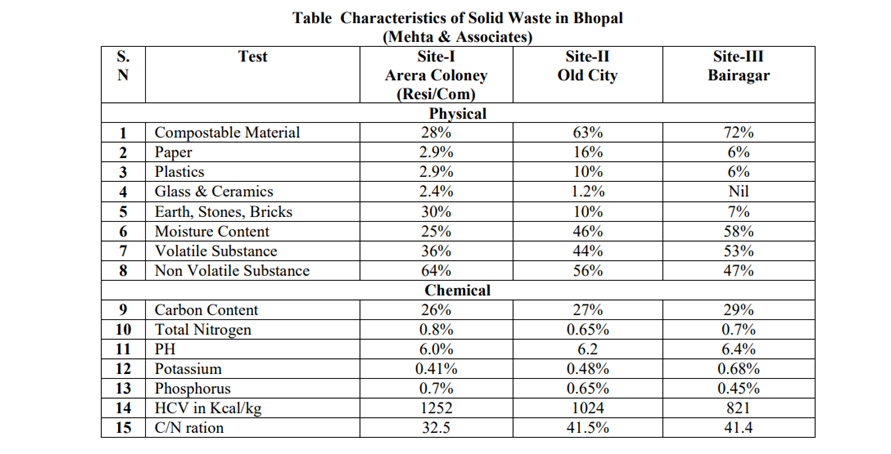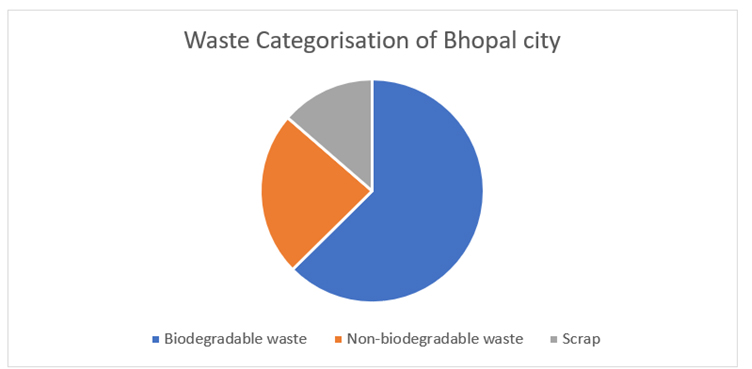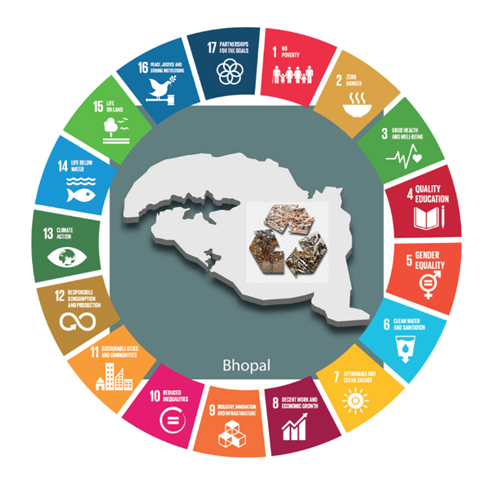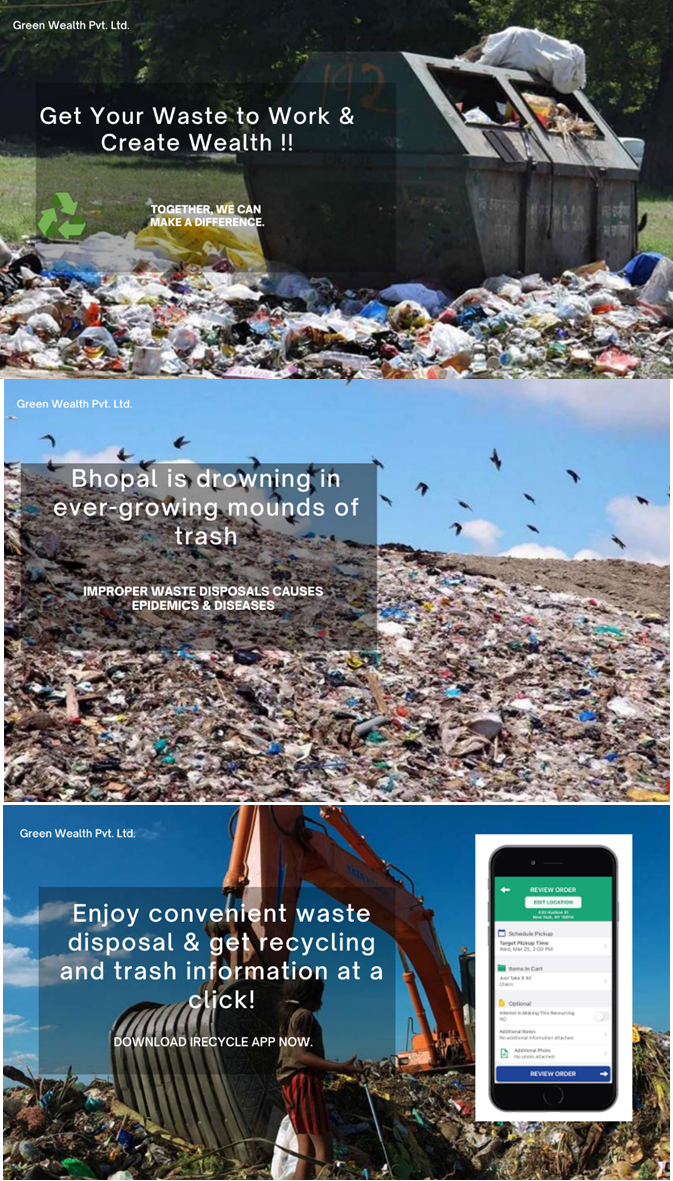SEMI FINAL S4 | BUSINESS CASE SCENARIO 11 | Waste To Wealth
Submission BCS
Marketing Plan for a Waste Management Project under "Waste to Wealth" scheme by MP Govt. for Bhopal city.
Submission Date & Time: 2022-10-10 17:35:50
Event Name: NMO Season 4 Semi Final
Solution Submitted By: Anvesha Roy Chowdhury
Assignment Taken
To propose a detailed marketing strategy and plan for a waste management project to be carried out under "Waste to Wealth" scheme by MP Govt. for Bhopal city.Case Understanding
The case mentions that smaller Urban Local Bodies (ULBs) like Bhopal has inefficient and financially non-viable municipal solid waste management practices. This is due to excessive running costs and non-availability of land. Under the scheme of "Waste to Wealth" the M.P. government is inviting proposals to present answers to the challenges being faced so that an integrated waste management facility is created in nearby ULB as well. The marketing department of our company has to propose strategies and plans in line with the government's expectations keeping in focus the objectives of Swaccha Bharat Abhiyan.BCS Solution Summary
Market research shows that the city of Bhopal is growing at a fast pace and thus the municipal solid waste generated by the city is growing in quantity day by day. This has caused the current waste management system to become inefficient. Considering the hazards of landfills, we will initiate segregation at the source of the waste itself to enable faster processing of the waste. We will convert the waste into compost, bricks, refuse-derived fuel, animal feed, energy, etc. which will prove to be useful in construction projects, factories, powerplants and to the consumer. Our company will emphasize on the resource value created while minimizing the impact on the environment, taking care of the sustainable development of the society. Our promotion strategy will focus on creating awareness to engage and sensitize the community, highlight that prevention is always better than cure, aiming towards conceptual paradigm shift of ‘making waste work’ and creating mass campaigns and collaborative partnerships. We will execute our proposed plan phase wise extending up to a 5 years plan. During Phase-1, marketing team would be running awareness campaigns encouraging people to realise the “green credits” and the conceptualisation of “wealth to waste”. We will initiate a door-to-door garbage collection team to help us in achieve the initial phase. Based on the success stories and pattern of segregations observed during Phase-1, the next phase will be carried out. This phase will also essentially take about a year and a half to mature and give the projected results for segregation, collection of waste and utilising the waste to create products of value like bricks, compost, animal feed, refuse derived fuel, generation of energy, etc. Phases 3 and 4 will be the final stages of the project when we expect the collection and segregation to reach 80-85% target. With the brand awareness of Green Wealth Pvt. Ltd. in place and services been tried and tested, this phase will be important to tap in the bigger collection points like marriage halls, ceremonies, community parks, etc, where we can offer services of waste collection and distribution for a certain fee.Solution
To create a winning proposal, we have done the appropriate background research of the issue being faced about solid waste management (SWM) at Bhopal city, researched on the demographics of the area and based on that laid the appropriate groundwork.
There are 2 main concerns in the current solid waste management system of Bhopal:
- Its SWM system is severely deficient
- Its SWM system has become financially unviable
Our company “Green Wealth Pvt. Ltd.” proposes the solution as shared below:
MARKET RESEARCH
Demographic Profile of Bhopal
Bhopal, the capital of the Indian state of Madhya Pradesh is a Tier-2 city. It stands among 15 largest cities of India. As of 2022, the population of the city is 2,505, 183 with population density of around 855 residents per square km. As per data available on Indiacensus.net, the current literacy rate of Bhopal is 80.37% and the working population is 65.22%. 21% amongst these are in the category of youth. The numbers indicate a potentially large percentage of people who are working and literate.
Waste produced by the city
As per research data of 2022, Bhopal generates nearly 886.5 metric tonnes of waste per day. Since the last three years, the Bhopal Municipal Corporation has established door to door collection scheme in which about 6000 rag pickers and 300 rickshaw pullers are engaged for waste collection. Out of the 4.5 lacs households in Bhopal, waste is collected from at least 2.5 lacs households daily. This waste is either unloaded in the nearby dustbins or at the collection centre from where the municipal vehicles lift the garbage and dumps it at the Bhanpura dumpsite. Moreover, the habits of people throwing garbage here and there, leads to even more pollution in the city and an increased problem of management of garbage.
For proper engaging these huge amounts of municipal waste in Bhopal, the entire Bhopal city is divided in 18 municipal zonal offices for proper collection, transportation and disposal of these solid waste.
There are many categories of municipal solid waste (MSW) such as food waste, rubbish, commercial waste, industrial waste, institutional waste, street sweeping waste, construction and demolition waste, sanitation waste, worship waste. MSW contains recyclables (pipe. plastic, polythene, glass, metals, etc.), toxic substances (paints, pesticides, used batteries, medicines, and electronics waste), compostable organic matter (fruit and vegetable peels, food waste) and soiled waste (blood-stained cotton, sanitary napkins, disposable syringes).
Characterization of the municipal waste shows that Bhopal has the highest proportion of mixed residue as organic material mixed with soil, mud, sand and other inert materials to the extent of 60%.

The waste produced by the city can be categorised as below:
Bio-degradable waste- Rubber, Leather, Paper, Rags, Compostable materials
Non-biodegradable waste- Inert waste like metal, wood, bricks, asphalt or cement concrete, and other building construction materials such as plaster, drywall, siding, shingles, insulation, and glass and plastic.
Scrap- consists of recyclable materials, usually metals left over from product manufacturing and consumption, such as parts of vehicles, building supplies, and surplus materials. Unlike waste, scrap has monetary value, especially recovered metals, and non-metallic materials are also recovered for recycling.
Based on the above data, graphically the waste can be categorised as:

STRATEGIC PLANNING (GO-TO MARKET STRATEGY)
About our Company
Green Wealth Pvt. Ltd. is looking forward to redefine municipal solid waste management (MSW) system in Bhopal
Our Vision: To reduce the amount of waste by promoting individual and corporate responsibility. To recover highest value from waste.
Our Mission: To become a leading enterprise for managing solid waste of Bhopal by promoting equitable, sustainable, environmentally sound and cost-effective practices through an integrated system of waste reduction, reuse, recycling, innovative technology, education and service.
Our Values
- Innovation
- Public education
- Resourcefulness
- Community Partnerships
- Integrity
- Equity
- Efficiency
Market Positioning
A leading enterprise for modern and scientific waste management services. We maximise resource value while minimising environmental impact.
Why Green Wealth Pvt. Ltd.?
Solution Platforms
We will explore a mobile technology platform to mitigate pollution caused by municipal solid waste and resolve waste management crisis while localizing sustainable development across Bhopal.
Innovation
Using Geo Location functionality, we will provide real-time access to convenient and affordable waste disposal service and likewise connect residents to nearest recycling stations where recyclable waste is exchanged for Green Credits which is convertible to currency for use in day-to-day transactions.
Circularity
Our company is centred around People, Planet and Prosperity while converting would-be pollution causing wastes to wealth for the development of the city of Bhopal. We will promote a circular economy through endless possibilities of recycling and provide residents with channels for convenient and easily accessible general waste disposal.

SWOT ANALYSIS OF GREEN WEALTH PVT. LTD.
Strengths
Our company is about two-decade old and is a well-established and known brand in Industrial waste management. The existing team is well-experienced to handle a similar portfolio as is available under the “waste to wealth” scheme through the project at hand. The vision of our company is in line with the goal of this scheme.
Weaknesses
To successfully handle this project, a totally new approach with a new strategy is required. It is required to create initiatives and awareness amongst the public of Bhopal since we have prior experience of handling industrial waste management only.
Opportunities
Our company has a good opportunity to venture into a new market and create a modern and scientific waste management system. The volume of waste is growing day-by-day, and we will have plenty of opportunities in the coming years, if we succeed to bag this project and execute it as per proposal. The initiative will further get many opportunities under Government of India’s Swaccha Bharat Mission.
Threats
We will be building an efficient waste collection and distribution system and do partnerships based on the current government’s policy of Swaccha Bharat Abhiyan. If there is change in the political environment, there will be change in focus and priorities of the government, which may cause disturbance in the long-term plans of Green Wealth Pvt. Ltd.
MARKETING PLAN
1. An efficient waste collection & distribution system
To negate the need of one common landfill that Bhopal currently has, we’ll deploy waste segregation at household level. Colour-coded bins or bags will be put up in every society and the residents will be required to dispose the trash as per the colour-code.
Green bin for Biodegradable wastes (Kitchen wastes and Garden wastes)
Blue bin for Dry wastes (Plastic, Paper, Metal, E-wastes)
Red bin for Reject wastes (Construction debris, sanitary wastes and sharps)
The biodegradable fraction of waste generated at Bhopal city is quite high, essentially due to the habit of using fresh vegetables in India. The high biodegradable fractions also warrants frequent collection and removal of solid waste from the collection points. To cut down the number of biodegradable wastes, we’ll encourage composting all organic wastes at household levels.
Ragpickers prefer to remove paper, plastics, rags and packaging and such other material, which is light and also have a high calorific value. The remaining waste hence tends to have a higher inert content and a lower calorific value.
We will make sure to generate reliable data on waste inventory and assure that there is proper structured flow of data on waste collection and processing to various stakeholders for informed decision making. Uniform data collection formats will be developed for cities and towns to start data collection in prescribed format. Suitable data collection format should include information like daily waste generation, collection, waste processed and sent for recycling, waste diverted from landfills and information collected should flow from sanitary inspectors to higher officials by suitably designated Management Information System (MIS).
2. Customer Service & Incentives
Reward systems and minimum lead time will be essential to develop long-term, mutually beneficial relationships with the customers. A mobile application named “iRecycle” will be introduced.
Green Wallet
This feature will connect the residents to neighbourhood recycling stations and they in exchange earn value, in the form of “Green Credits” in their Green Wallet by recycling plastics, carton boxes, used beverage cans, metals and even e-wastes. With the green credits they earn, the residents can pay their utility bills like water bills, electricity bills, telephone bills and gas bills. Groceries, food items and other consumables can be ordered with green credits.
3. Awareness Campaigns & Promotion
We need to apply social marketing strategy which is proven to significantly contribute to help attain specific program objectives and goals. Do an awareness-based promotion strategy.
Community engagement & sensitization
- We’ll encourage direct community-member engagement and accountability- creating phase-wise awareness campaigns and knowledge sharing on being a responsible citizen as a part of Swaccha Bharat Abhiyaan.
- We’ll handle community sensitization on proper waste disposal, recycling and environmental sustainability.
- The importance of segregation at source will be reinforced by us through workshops at schools, societies and offices.
- A target will be set in priority on the amount of recycling we are expecting and AI driven analytics of the amount of waste collected from every region of Bhopal city and the subsequent wealth generated will be uploaded monthly on our website, application and social media platforms. The residents will be notified of the same through push notifications.
- Upcycling will be encouraged by spreading awareness, supportive eco-systems and industrial symbiosis.
Highlight that Prevention is always better than cure
Teaching residents to make small changes that are eco-friendly will have a lasting impact. We will encourage them on the following preventive steps:
- Use a reusable bottle/cup for beverages on-the-go.
- Use reusable grocery bags and not just for groceries.
- Purchase wisely and recycle
- Compost it!
- Avoid single-use food and drink containers and utensils.
- Buy second-hand items and donate used goods.
- Curb your use of paper: mail, receipts, magazines
Conceptual paradigm shift of ‘making waste work’
- We’ll build a paradigm shift in the minds of common people that waste works for us. This shift will nudge the residents to think how can a waste be converted into something useful when every time a waste is generated at their place.
- The marketing principle of AIDA (Awareness>Interest>Desire>Action) will be applied to promote this idea.
- Organise healthy competitions at residencies, organisations and regional levels to check who conserves/treats maximum percentage of waste produced. Reward those who create wealth from waste or suggest innovative ideas to do so.
Create campaigns with hashtags “#GreenWealth #isupportgreenwealth #iRecycle”
- We’ll do SEO optimisation and use of social media platforms like Instagram, Facebook, Twitter, etc. to run targeted awareness campaigns in the form of creative reels, videos, posters. These will be non-skippable posts.
- Our website will clearly outline all our attributes and benefits. The website and mobile application will be used for pushing notifications to create awareness among residents. Our easy-to-use app named “iRecycle” will leverage mobility to transform Bhopal to an emerging smart city.
- Through our mobile app, individuals can choose the available slot and day of disposing the segregated garbage. Slot will be available based on area, load of collection, etc. Once assigned, our waste collection team will arrive within the slot to collect the waste and as per the set standards “green credits” will be assigned immediately in the disposers account in our app. Individuals will be able to get information on how their trash was used to create something meaningful. They’ll be able to track their individual carbon footprints on day-to-day basis. This will help them be connected in a process that is for the greater good for planet Earth.
- We’ll use sponsored YouTube Ads on famous entertainment channels to increase awareness and recall.
- Interactive sessions will be held on our handles to receive new ideas. Innovative solutions will be duly rewarded.

The above are the screenshots of swipe able landing page of our website.
Seasonal marketing
The quantity of MSW generated depends on a number of factors such as food habits, high standard of living, degree of commercial activities, education back ground of population, religious value of place, seasonal and climate patterns. We have to allocate funds respectively to target maximum population.
Collaborative partnerships
We will collaborate with organizations whose core values and impact-focus clearly aligns with ours and advances sustainability, as together we can make the world a better place for all.
Some of our areas of interest are Strengthening of Urban Waste Collection Systems, Enterprise Mentoring, Acceleration, Impact Funding, Technology and Knowledge Sharing.
4. Products which can be manufactured from the waste generated as per the market needs
Technological advancement is an important factor that can drive effective waste management. We will use emerging technologies such as automatic waste segregators, onsite waste processing like Composting/Biomethanatio/Bio CNG, gasifiers/pyrolysis, etc. to transform the current waste management scenario in Bhopal.
Environment-friendly gulal
We’ll install low-cost bio-digester drums near temples and municipal parks of Bhopal to turn flowers and leaves into compost. The enormous floral waste will be used to make environment friendly gulal.
Upcycling to produce new materials
Upcycling is creative reuse- the process of transforming waste materials, by-products and unwanted products into new materials or products of better quality and environmental value, while retaining the characteristics of the original material. Upcycling reduces carbon emissions and helps save energy and water. We’ll tie up with an upcycling venture and help with collection centres and send the waste materials to them.
Polyester fabric
There is a factory in the industrial belt of Silvassa in Dadra and Nagar Haveli that has the capacity to process 25,000+ tonnes of plastic a year. We will tie up with them to re-use plastic bottles to make polyester fabric.
Animal feed from organic wastes
Bhopal accounts for nearly 60% of organic wastes. There is immense potential of using the same as animal feed with strict and proper regulations. We’ll make efforts to recover, recycle and recondition organic waste by converting it into useful value-added products such as bioactive compounds, enzymes, livestock feed, bio-fertilizers, biofuel, etc.
Compost
As much as 25% of the items in Bhopal’s trash could potentially be removed from the waste stream and composted in residents’ backyard. The fruit and vegetable scraps, egg shells, coffee grounds, grass clippings and leaves can all be composted. Using compost in garden saves on fertilisers and they’ll get improved yields on the vegetables they grow.
Bricks
The non-biodegradable fraction including ash and fine earth content of municipal solid waste is high due to the practice of inclusion of the street sweepings, drain silt, and construction and demolition debris in municipal solid waste. The sludge produced in sewage treatment plants can be mixed with the construction waste to produce bricks. Such bricks will be stronger, easier to manufacture and have more plasticity.
We’ll do a joint venture with a local brick kiln for production of bricks.
Energy generation
An empty plastic bottle of average size has an energy potential of about 1 kWh while an empty can has about 0.46 kWh, but when thrown into residual waste, the energy is lost. We will sort the cans and bottles using a sensor-based technology that allows for many different types of materials to be sorted and recycled. With our technology, we can process MSW and extract plastic and metals through various screening steps. The result will be pure and high-value organic waste ready for reuse. High labour cost and quality control issues will be reduced due to automation of recycling. Sorting will be optimised and environmental standards will be met.
We will partner with Babcock and Wilcox Volund, one of the global leaders in supplying equipment and technologies designed to convert household waste and biomass into thermal energy. A waste-to-energy plant is an ecological and cost-effective way of energy recovery by converting MSW into electricity and/or heat. Energy is generated by burning waste at high temperatures to create steam which drives a wind turbine to create electricity.
Properly dried and sorted waste can provide a potent (and green) source of fuel for some industrial processes, like for power generation and cement kilns. These energy sources may also qualify as renewable energy and therefore provide access to carbon credits or other subsidies designed to encourage green activities.
Refuse derived fuel (RDF)
Refuse derived fuel has a calorific value of 3700 Kcal/kg which is almost equal to that of coal and releases fewer pollutants upon combustion. RDF is generated from MSW that is dried, crushed, screened and packed into brick form. The clean and non-polluting fuel is used as a substitute for conventional fossil fuels such as coal which is in short supply. Combustible waste materials of Bhopal can be converted into RDF.
Art pieces
Upcycled materials will include packaging material, e-waste or simple household goods. We can upcycle old clothes, plastics, tyre tubes, broken glass, wood pieces and multi-layered plastic packaging into stylish products and art pieces. Such art pieces will be displayed in public places and sold in local markets which will indirectly convey our mission of making wealth from waste.
EXECUTION OF THE PROPOSED PLAN
Setting up an effective plan for municipal solid waste management has to be executed phase-wise as there are many stakeholders involved. We have segregated the proposed plan into four phase – extending up to a 5 years plan.
Phase-1 of 1.5 years’ timeline:
During this time, marketing team would be running awareness campaigns encouraging people to realise the “green credits” and the conceptualisation of “wealth to waste”. We will initiate a door-to-door garbage collection team to help us in achieve the initial phase.
- At first, we will carry out a survey to understand existing Door to Door solid waste management system.
- Based on the data collected, we will divide the city region wise.
- We will carry out a pilot project to understand the response & success. Our team will approach the societies & door to door with a one-page flyer explaining the segregation methodology and the green credits related to it.
- We will map the results through the data captured through our integrated application.
- Collaboration with organizations whose core values and impact-focus clearly aligns with ours and advances sustainability shall be initiated.
Phase-2 of 1.5 years’ timeline:
Based on the success stories and pattern of segregations observed during Phase-1, the next phase will be carried out. This phase will also essentially take about a year and a half to mature and give the projected results for segregation, collection of waste and utilising the waste to create products of value like bricks, compost, animal feed, refuse derived fuel, generation of energy, etc.
Phase- 3 & 4 (Last two years of plan):
These will be the final stages of the project when we expect the collection and segregation to reach 80-85% target. With the brand awareness of Green Wealth Pvt. Ltd. in place and services been tried and tested, this phase will be important to tap in the bigger collection points like marriage halls, ceremonies, community parks, etc, where we can offer services of waste collection and distribution for a certain fee. Our dedicated team will guide these kind of seasonal event managers.
Conclusion
Green Wealth Pvt. Ltd. has to focus on providing high-quality service and products that lead to the growth of its stakeholders. We have to take into consideration innovative technologies for waste management and marketing techniques to interact with citizens. Since waste does not immediately meet the criteria of being seen as a wealth by anyone, people only change the mindset once the value is tangible or comprehensible to them in one form or the other. The role of our company in municipal solid waste management will not only be efficient collection and distribution system, but also to create awareness amongst the residents of Bhopal. We will employ new innovations and technology to create maximum wealth from waste in an even shorter period of time. Organizing campaigns and healthy competitions at the residencies, organizations, and regional level to treat the maximum percentage of waste produced for acknowledgment and rewards by the government will act as positive reinforcement and inculcate the habit of segregation among the masses without external force.Attached File Details
View Attachment file (Green Wealth Pvt. Ltd. Presentation.pdf)Video
This presentation is a brief document stating the overview of our company and the scope of its work and the principles it followsComments
Article Type: Business Case Scenario, Case Study Solution Submission
Business Case Detail
Title: SEMI FINAL S4 | BUSINESS CASE SCENARIO 11 | Waste To Wealth
Type: Case Study
Stream: Management
Participant
Team Galileo
Total Team Points: 78085
Team Nicolaus
Total Team Points: 124320